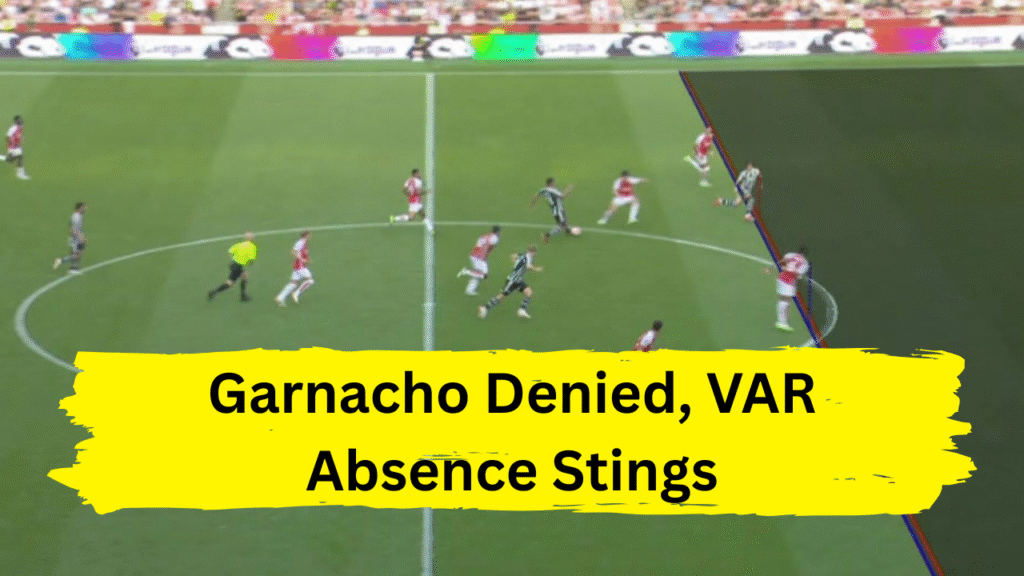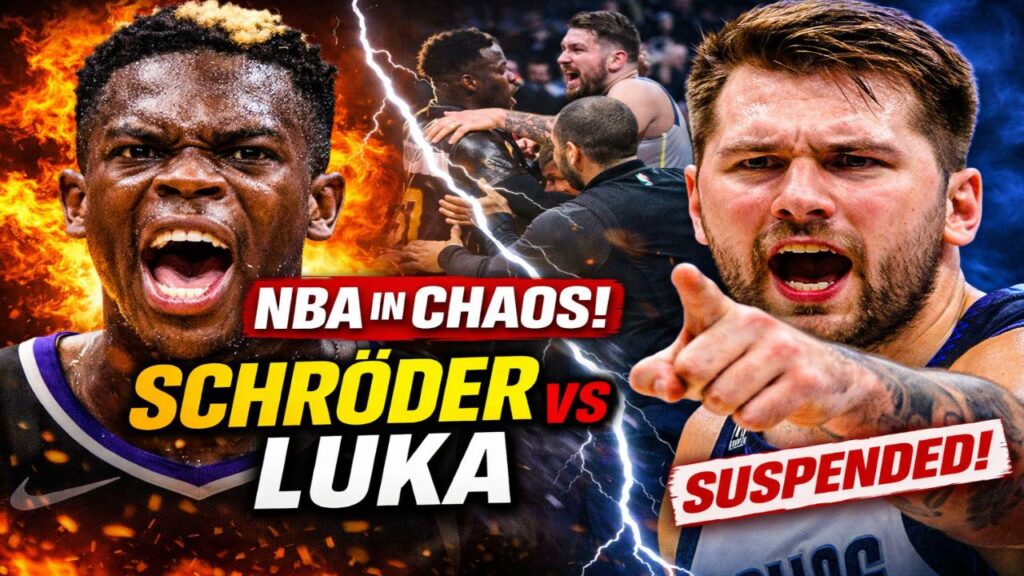The roar of Manchester United fans swelled as Alejandro Garnacho slotted the ball into Brighton’s net in the 67th minute. The electric winger had seemingly completed a stunning counterattack, turning a 1-1 stalemate into a 2-1 lead with surgical precision. For a few euphoric seconds, Old Trafford pulsed with relief—until a digital eye in the sky intervened. What followed was a disallowed goal so bizarre, so geometrically improbable, it encapsulated football’s collision with technology and left United’s season gasping for air .
The Anatomy of a Controversy
The sequence began with Bruno Fernandes releasing Amad Diallo down the right. Diallo’s blistering run and return pass to Fernandes set the stage for the captain’s whipped cross. As the ball fizzed across the box, it eluded striker Joshua Zirkzee but fell perfectly to Garnacho at the far post. The Argentine’s first-time strike rocketed into the net—a moment of instinctive brilliance. On-field officials awarded the goal. Then, VAR activated .
Replays revealed a nightmare scenario for United: the ball had deflected off Zirkzee’s knee en route to the net. Though Zirkzee wasn’t the scorer, he was passively offside by the slimmest margin—his knee hovering millimeters ahead of the last defender. Under Law 11, even inadvertent contact by an offside player constitutes interference. VAR ruled Zirkzee had altered the ball’s trajectory, nullifying Garnacho’s effort. The Premier League’s official account later clarified: “The VAR checked for a potential offside against Zirkzee and recommended the goal be disallowed” .
The Cruel Geometry of Offside
- Passive vs. Active Involvement: Zirkzee made no deliberate play for the ball, but his position—and the ball’s deflection—deemed him “interfering with play.”
- The Millimeter Margin: Freeze-frames showed Zirkzee’s knee breaking the plane of offside. Such precision, once unmeasurable, now defines outcomes.
- The Human Cost: Garnacho’s despair was visceral. A legitimate strike erased not by his error, but by a teammate’s positioning in the buildup.
VAR’s Shadow Over Garnacho’s Season
This incident was no outlier for Garnacho. All season, the winger found himself at the center of VAR storms:
- Europa League Handball Ignored: Against Athletic Club, fans raged when VAR overlooked Garnacho’s apparent handball seconds before United won a penalty. Social media erupted with accusations of “corruption” .
- Penalty Denial vs. Spurs: Garnacho tumbled under Destiny Udogie’s hold in the box. VAR deemed it “too easily” going to ground, despite contact .
- Tyler Adams’ Tackle: Bournemouth’s Adams escaped red after a two-footed lunge on Garnacho. VAR controversially upheld a yellow, calling it “reckless not serious foul play” .
Each incident amplified frustrations around consistency. Why was Adams’ airborne tackle not “serious foul play” when similar challenges drew reds? Why did Zirkzee’s deflection negate a goal, while other deflections went unpunished? United’s manager Ruben Amorim voiced a familiar lament: “I think it will turn”—but it rarely did .
The VAR Paradox: Precision vs. Soul
The Zirkzee offside epitomizes VAR’s double-edged sword. Technically correct, it felt emotionally unjust. Football’s soul thrives on spontaneous eruptions of joy—now tempered by the dread of a pixelated review. When Garnacho wheeled away in celebration, he embodied that raw passion. VAR’s intervention replaced it with sterile compliance .
Yet, United also benefited from VAR’s absence. In an FA Cup clash against Leicester, Harry Maguire’s stoppage-time winner stood only because VAR wasn’t used in early rounds. Replays showed Maguire offside—a mirror image of the Zirkzee incident. As The Athletic noted, “VAR would have ruled out the winner” . This irony underscores VAR’s greatest flaw: contextual inconsistency. Decisions hinge not just on laws, but on competition rules, subjective interpretations, and which officials happen to be watching.
The Human Toll
For Garnacho, these controversies aren’t abstract debates. They’re career-altering moments. His disallowed goal against Brighton preceded a 95th-minute winner for Brighton—a psychological gut punch . Against Leicester, his electrifying second-half substitute appearance catalyzed United’s comeback, proving his game-breaking impact . Yet, his reputation also suffered. Referees now scrutinize his runs for simulation, as when Espen Eskaas ignored his penalty appeal vs. Athletic Club. Ex-PGMOL chief Keith Hackett praised the call: “Garnacho has gone to ground too easily” .
💡 Key Takeaway: Garnacho’s season became a microcosm of football’s tech revolution—where talent is judged not just by defenders, but by algorithms and angles.
Beyond the Freeze Frame: What Replays Showed
Revisiting the Brighton incident, two truths emerge:
- Technical Accuracy: By the letter of the law, Zirkzee was offside. His position demonstrably impacted the play.
- Philosophical Failure: The goal reflected football as fans love it—a rapid counter, teamwork, and a lethal finish. Punishing a marginal, unintentional touch epitomizes how VAR can undermine the sport’s spirit.
As former players and pundits debate, fans are left grappling with a question: Do we want perfection, or passion? Garnacho’s erased goal offered both—a masterpiece born of instinct, destroyed by science.
The Road Ahead
Football must reconcile these tensions. Semi-automated offside technology (coming to the Premier League next season) may expedite decisions, but it won’t resolve debates over “interference” or the erosion of spontaneity . Garnacho’s ordeal reminds us that football is human. Its errors and euphorias are meant to be shared, not dissected in silent replay booths.
As United’s season fades, that disallowed goal against Brighton lingers—a symbol of modern football’s fractured soul. In the cold light of replay, Garnacho was onside, Zirkzee was off, and the net bulged. But in the stands, a sport wondered: At what cost?


